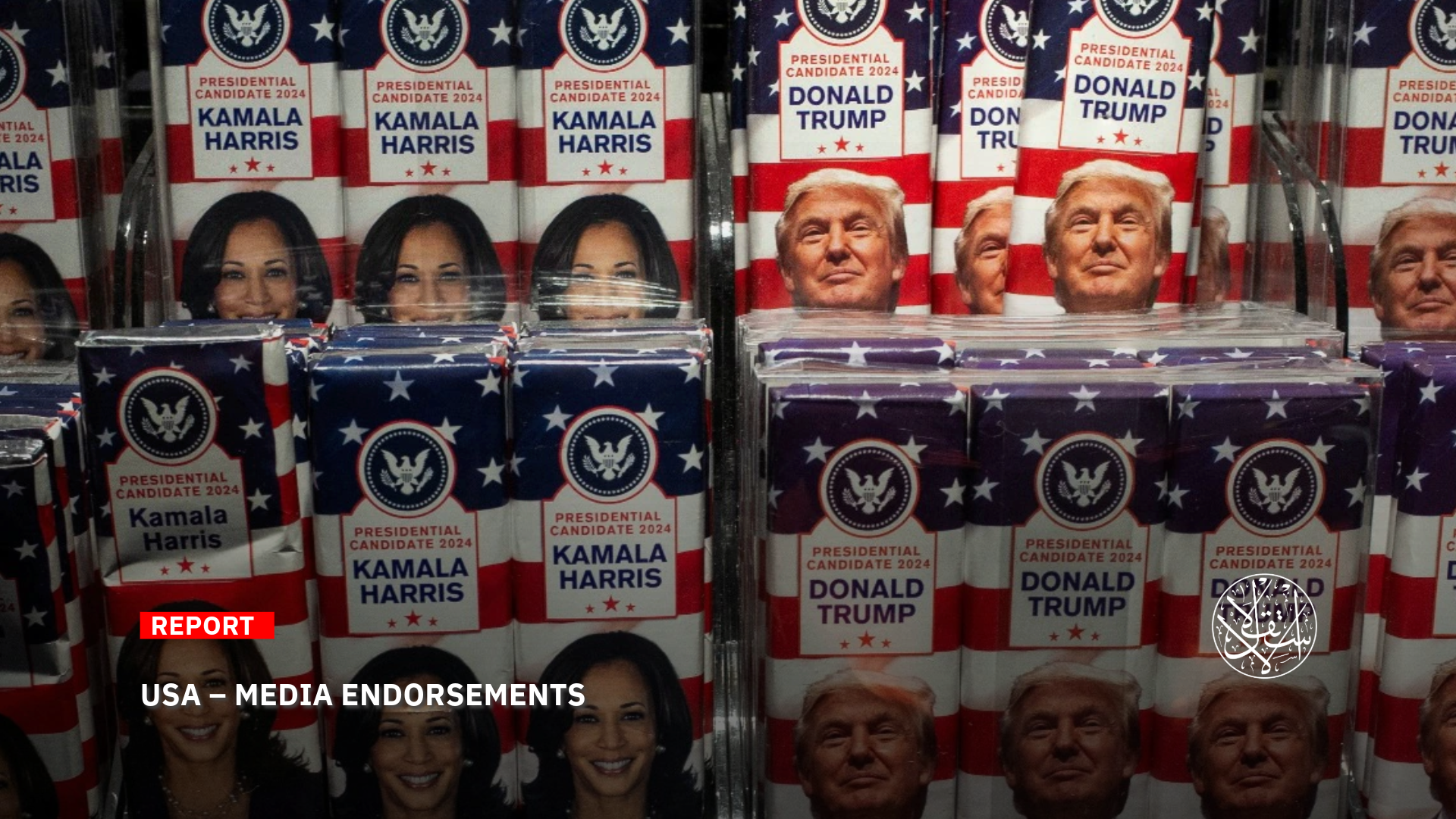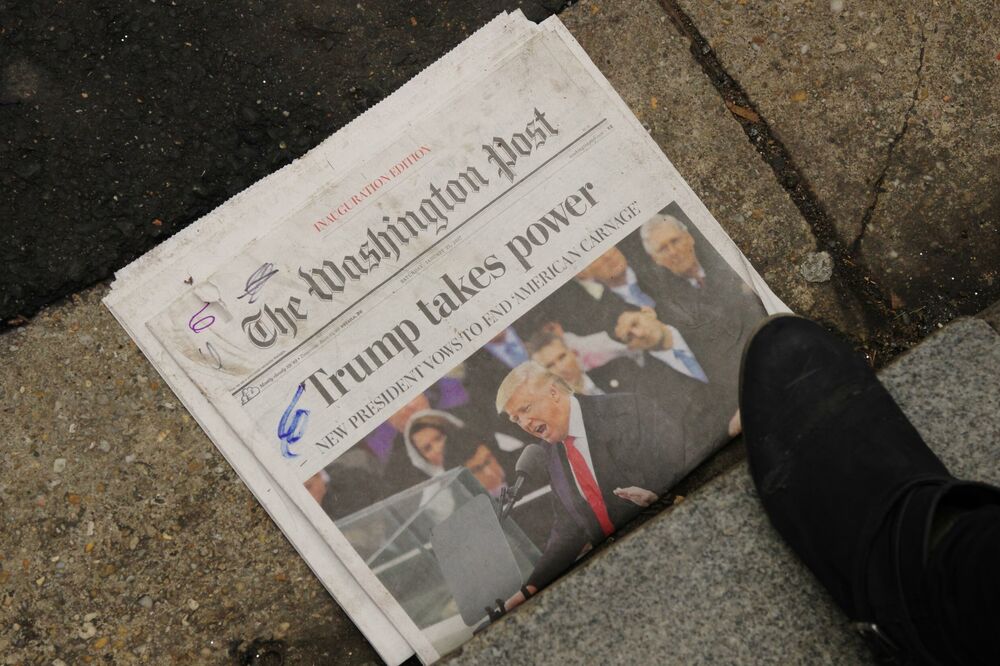How Newspapers' Decision Not to Endorse a Presidential Candidate Disrupted the American Media Landscape

“Newspapers’ decision not to endorse a presidential candidate disrupted the American media landscape.”
As the November 5 US presidential election approaches, media endorsement for both candidates, Kamala Harris and Donald Trump, has increased, despite many major newspapers leaning neutral.
Unlike the 2016 and 2020 elections, this year’s election has seen a marked decline in the number of newspapers endorsing a presidential candidate.
Harris has received endorsements from about 80 media outlets, including the New York Times, Vogue, the Seattle Times and the San Antonio Express-News.
Trump, in turn, has received endorsements from 11 media outlets, including the Washington Times, the Review-Journal and the New York Post.
In contrast to previous elections, far fewer media outlets have endorsed a candidate in this race. In 2016, over 240 media outlets endorsed Hillary Clinton, while 120 media outlets backed Joe Biden in 2020.
However, the decision by some prominent newspapers, including The Washington Post, Los Angeles Times and USA Today, not to endorse any candidate has been widely criticized, as it has been seen as a favor to Trump and a vote of no confidence in Harris.
Observers worry that a Trump re-election could see renewed efforts to target critics, prompting media owners to withhold endorsements to safeguard business interests.
Media Earthquake
The Washington Post recently shook up the media landscape when it suddenly announced that it will not endorse any candidate in the upcoming presidential election, breaking with a long-standing tradition that has lasted for more than four decades.
According to the French newspaper L'Express, this decision was not limited to the current elections only, but will extend to all future elections.
The Washington Post's CEO William Lewis explained that this step represents a return to the roots, citing a similar position taken by the newspaper in the 1960 elections won by John Kennedy.
However, this justification did not prevent a wave of sharp criticism that the newspaper faced, both from its readers and from its journalists themselves.
A number of editors and writers resigned, including 3 out of 10 members of the newspaper's editorial board.
Journalist Ruth Marcus also expressed her deep disappointment, describing the decision as a tragic mistake at a critical time in the country's history.
L'Express revealed the escalation of tensions within the newspaper, as the Journalists Syndicate directly accused the newspaper’s owner, Jeff Bezos, of intervening to prevent support for Democratic candidate Kamala Harris.
Although sources close to the newspaper’s management denied these accusations, the controversy raised reflects the depth of the crisis that American media outlets are experiencing in their relationship with the political process.
According to reports, up to 250,000 subscribers, or 8% of the total, have canceled their subscriptions, according to Bloomberg, which is a blow to a media outlet that is already facing financial difficulties.
In turn, Bezos indicated that the decision aims to address a credibility gap in the media industry.
The Washington Post’s announcement regarding the endorsements came on the same day that Trump met with Dave Limp, CEO of Bezos’s aerospace company Blue Origin, according to Axios.
Bezos denied in an op-ed published on October 28 that the meeting was a factor in his decision, saying, “There is no connection between the meeting, which he said he knew nothing about in advance, and our decision on presidential endorsements.”
On his part, US Senator Bernie Sanders criticized the Washington Post owner’s decision, noting that Bezos feared angering Trump and losing federal contracts to Amazon.
Deep Divisions
The crisis did not stop at The Washington Post, as the French newspaper L'Express revealed a similar development in the Los Angeles Times, as its new owner Patrick Soon-Shiong refused to approve the editorial board’s decision to support Harris.
Thousands of readers also canceled their subscriptions to the paper, three members of its editorial board resigned, and nearly 200 employees signed an open letter to management demanding an explanation.
But the newspaper’s owner insisted in an interview with a Los Angeles Times reporter that he did not intend his position to favor Harris or Trump.
Los Angeles Times, California’s largest newspaper, has endorsed every Democratic presidential candidate in every general election since Barack Obama’s campaign in 2008.
Some local newspapers publicly defended their decision not to endorse by arguing that Americans don’t need editorial boards to inform their vote.
For some newspapers, a non-endorsement is standard; The Wall Street Journal hasn’t endorsed in a presidential race since 1928, when it backed Republican Herbert Hoover.
In a scene that reflects the deep divisions in American media, The New York Times took a decisive stand by openly endorsing Harris.
The French newspaper L'Express quoted the newspaper’s editorial board as describing Harris as the only national choice, while calling Trump the most unqualified candidate for president in U.S. history.
This stance was also joined by other influential newspapers, including The Boston Globe, The New Yorker magazine, The Seattle Times, The Philadelphia Inquirer, The Denver Post and the San Antonio Express-News.
Conservative and right-leaning news outlets, including the New York Post, The Washington Times and the Las Vegas Review-Journal, have endorsed Trump.
The New York Post, owned by Rupert Murdoch, declared that America is ready today to restore the heroic Donald Trump to the presidency.

Potential Implications
Media endorsements have historically played a significant role in American elections.
Experts argue that newspapers justify endorsements based on careful candidate analysis, providing readers with what they describe as informed guidance.
This unprecedented media division comes within a broader context of profound shifts taking place in American media, as the influence of capital on the editorial policies of media outlets increases.
Looking ahead, whether this shift toward neutrality will build public trust or further polarise audiences remains uncertain.
It also comes at a time when Harris is facing major challenges in her election campaign, especially in light of opinion polls showing a close race with Trump.
Added to these challenges is the decline in the influence of traditional media on voters, with their increasing reliance on new digital platforms such as podcasts and TikTok.
Experts also deeply analyzed the potential implications of these changes for the future of the relationship between media institutions and the democratic process in the United States.
They pointed out that the recent decisions may represent a turning point in the history of American media, and may indicate the end of a long era of the traditional role of major newspapers in directing public opinion during presidential elections.

“Businessmen who own liberal media outlets and newspapers fear negative implications if Trump wins, and are therefore trying to hedge their risks,” activist Omar Taha told Al-Estiklal.
Mr. Taha believes that “the divisions in both society and the media landscape will worsen as the announcement of the new US president approaches.”
Sources
- In a close election, the American media does not want to be insulted later [French]
- US election: Why did LA Times, Washington Post skip candidate endorsement?
- Jeff Bezos intervenes to halt candidate endorsement as Washington Post breaks 36-year tradition
- How every paper of record is endorsing — or not — in the US presidential race
- What is the history of newspaper endorsements and can they swing elections?











